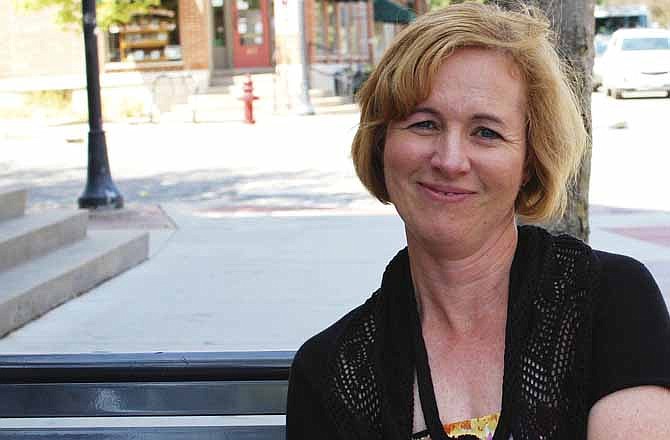IOWA CITY, Iowa (AP) - Tara Fall walked out of the salon feeling good about the first new haircut and coloring she'd had since shaving her head for surgery a couple of years earlier.
So good, in fact, that outside the door she smiled at a stranger, who fell into step with her down the concourse of the busy shopping mall. Fall thought it was odd the woman was matching her pace step for step, but she gave the woman another look and smile.
The woman veered closer, and Fall started to feel uneasy. When the woman bumped into her shoulder, Fall wheeled, ready to brush her back. Instead, her hands hit the glass.
The makeover had turned her own reflection into that of a stranger, she realized.
"So I've learned to never, ever change my looks drastically," Fall says today, now able to laugh at the story, and the many others she tells like it. "Because if I change them drastically, there's no ability to comprehend who the person is in the mirror."
Fall, a 37-year-old Monticello native, is one of the 525 people with damage to a specific region of their brain who volunteer as members of the Iowa Neurological Patient Registry, which is coordinated by researchers at the University of Iowa.
Fall has prosopagnosia, a neurological disorder characterized by the inability to recognize faces and a condition she's lived with since suffering a stroke during brain surgery to treat her severe epilepsy in 2003. Since then, Fall has made a point to return to Iowa City each year to work with experts at UI.
Fall, who now lives with her husband and two children in Menifee, Calif., takes part in the research not with hopes of helping her own cause - there are no treatment options for prosopagnosia, just coping mechanisms - but with the idea that she is helping to advance the scientific knowledge of how our brains work.
"I'm trying to pay it forward," said Fall, who was in Iowa last week for tests at UI. "I look at what they're doing, and the progress they make. I'm not so hopeful to think that what I'm doing today will have an impact on my epilepsy or my prosopagnosia, but I see the impact it's having in other areas, and it's exciting. ... I'm giving something that so many people are going to gain so much from."
The Iowa Neurological Patient Registry began in 1982, the brainchild of UI neurology and psychology professor Daniel Tranel and former UI neurology professors Anotnio and Hanna Damasio. It has since become what Tranel believes to be the best patient registry of its kind in the world.
"It's really provided a unique resource to study neurological problems and neurological diseases and to really give us some strategies to conduct research that hopefully will identify cures and preventions for neurological diseases," said Tranel, the registry's director, in a statement.
Nine years ago, Fall, who had suffered from epilepsy since age 13, underwent surgery at University of Iowa Hospitals and Clinics to cut away tissue from her temporal lobe with the hopes of controlling her seizures, which had become life-threatening.
Fall suffered a stroke during the operation, and when she awoke, the left side of her body was paralyzed, and she had lost most of her eyesight. Through therapy, she regained her body movement, learning to walk again alongside her 1-year-old daughter, who took her first steps the same week Fall did the same.
"It helped me connect with my kids more," Fall said of her recovery. "It helped me have patience with them more. We learned to walk at the same time. We learn to button our shorts at the same time. And as they grew, I got better at everything, and so did they. It was a rewarding process to develop while my kids were developing."
Fall's vision returned to about 50 percent, but she eventually learned she faced another, invisible disability: When she met someone she had not previously known before her stroke, she was unable to remember what they looked like. Even people she had known for years but had aged or were growing up, her own daughters included, became unrecognizable.
"So my world has basically become a world of strangers," Fall said.
Fall has learned to rely on other cues to get by, honing her observation skills and recognizing people by studying how they talk, walk and dress.
"If you were to put head shots down here, and one was you, I'd have no clue. If one was me, I'd have no clue," Fall said. "But I can tell you everything about the way you're sitting, I can tell you everything about the pen you're using, about the shirt you have on, the pants you're wearing and I can even tell you about your shoes. So it's not that I'm blind. I can see and remember things. But I'll give you a million chances to make your first impression with me."
Today, Fall, a stay-at-home mom, is an advocate for the registry and a public face for prosopagnosia. In recent years she's appeared on the "Today Show," given talks at UI and started a blog about her experiences.
"All in all, I would do every piece of this again if I ever had the opportunity," Fall said. "I've gained so much more, and learned to appreciate and love so much more than anything that was taken away from me."
Information from: Iowa City Press-Citizen, http://www.press-citizen.com/

